Klanglandschaften
Deutsche Übersetzung weiter unten
The Italian composer and musician Luca Longobardi is a person who has his heart in the right place. An outstanding composer who knows how to bundle the aura of melancholy and emotions that they manifest, forever deep in the heart of the listener. Recently impressive on the album The Yard Sale, but also in terms of audiovisual art, the Italian leaves the visitors with astonishment. So it's time to ask the charming composer a few questions.
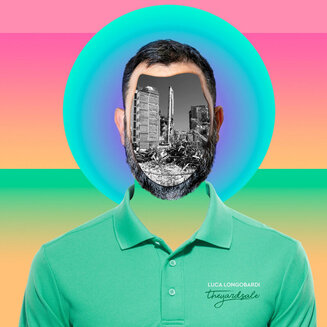 The Yard Sale was released in late 2019.
The Yard Sale was released in late 2019.
Hello Luca, how are you doing right now?
Fine! Busy, a bit stressed for I am working on thousand things at the same time but still smiling!
The Yard Sale is your last album, where you follow progressive approaches. What were the reactions to that?
People are (fortunately) loving it! Vinyls finally arrived (it took forever for also the color of the disk was made on purpose!) and the super colored artwork is now going to 18 different countries. And I am very happy because The Yard Sale is more than a musical project. It came out with a precise esthetical idea and the whole process of its making was fulfilled with images and video inputs. My interest in visual art became stronger in the past two years and that had an effect on my compositional process. As I used to say, The Yard Sale is the first public step out of my comfort zone.
Can you reveal which piece you have been working on for a long time before it was perfect for you?
3.32.39, from the album Plume. It is a very intense piece, written in memory of the victims of the earthquake that shocked the city of L'Aquila in 2009 and a hymn to survival, to reconstruction. The actual value and the delicate construction of the piece required me to work on it perhaps like no other piece ever.
You are also subject to acoustic evolution, so there are always new ways and styles to interpret classical music - how and where do you collect creativity for it?
I observe a lot what is around me, my main source of inspiration is my daily life. It is from there that I draw to tell my stories. So I start thinking about which colors to use, which tools would be the best to describe them. I really like to study the sonic possibilities of the instruments I own and often from this investigation new ways of approaching the creative process are born. Last but not least, I listen to a lot of music, often different. I like to buy records, dedicate myself to listening carefully, I listen over and over again to what I like because I think it is the best way to discover up to every grain of the thought and work of another composer.
How do you think modern classic will develop, more modern nuances or back to old school?
Let’s wait for Nils Frahm’s next album to find out about it!
Fine! Busy, a bit stressed for I am working on thousand things at the same time but still smiling!
The Yard Sale is your last album, where you follow progressive approaches. What were the reactions to that?
People are (fortunately) loving it! Vinyls finally arrived (it took forever for also the color of the disk was made on purpose!) and the super colored artwork is now going to 18 different countries. And I am very happy because The Yard Sale is more than a musical project. It came out with a precise esthetical idea and the whole process of its making was fulfilled with images and video inputs. My interest in visual art became stronger in the past two years and that had an effect on my compositional process. As I used to say, The Yard Sale is the first public step out of my comfort zone.
Can you reveal which piece you have been working on for a long time before it was perfect for you?
3.32.39, from the album Plume. It is a very intense piece, written in memory of the victims of the earthquake that shocked the city of L'Aquila in 2009 and a hymn to survival, to reconstruction. The actual value and the delicate construction of the piece required me to work on it perhaps like no other piece ever.
You are also subject to acoustic evolution, so there are always new ways and styles to interpret classical music - how and where do you collect creativity for it?
I observe a lot what is around me, my main source of inspiration is my daily life. It is from there that I draw to tell my stories. So I start thinking about which colors to use, which tools would be the best to describe them. I really like to study the sonic possibilities of the instruments I own and often from this investigation new ways of approaching the creative process are born. Last but not least, I listen to a lot of music, often different. I like to buy records, dedicate myself to listening carefully, I listen over and over again to what I like because I think it is the best way to discover up to every grain of the thought and work of another composer.
How do you think modern classic will develop, more modern nuances or back to old school?
Let’s wait for Nils Frahm’s next album to find out about it!
My classical training has led me to strive for a performative perfection
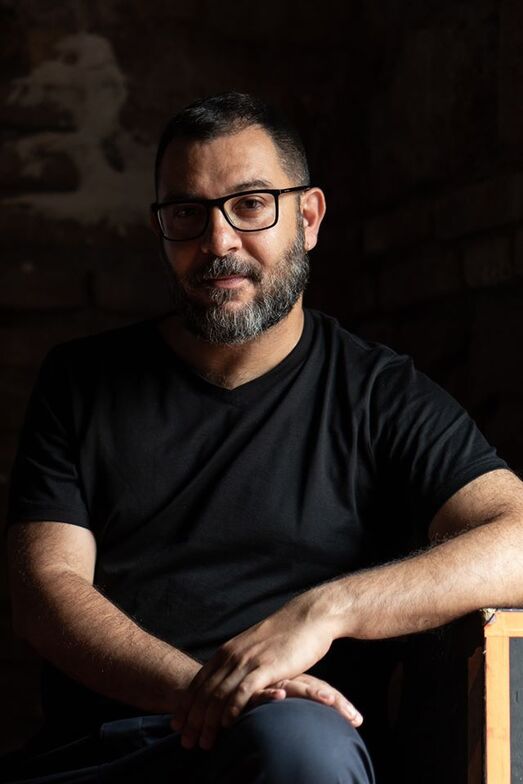 The Italian composer Luca Longobardi.
The Italian composer Luca Longobardi.
Is classical music with innovation more difficult than other areas of music?
Innovation is never easy, also because innovation, to be such, needs a temporal definition and sharing. In other words, it needs recognition. I can think of being the first to change something and instead that thing has already been done some time before, in another part of the world, without my knowledge. Yet it remains an innovation in my personal language thou, a novelty for my way of conceiving music. In the early 1900s, classical music took two paths: those who drew from the past, such as Stravinsky or Bartok, rewriting some rules of style and retaining others, and those who thought of a different approach, placing performances and new languages at the center of the artistic expression, such as Copland or Cage. Now we are in an era in which this umpteenth reworking of the classic rules serves a very large pool, like that of audio-video (TV) and passive listening (playlists of 32 hours of music!).
Not the style at the center of creative thinking nor the performance but the taste of the ultimate actor of the chain who is the audience. It looks like the commercial need to place our music in a Spotify playlist or on Netflix series is more important than our specific research about that music. Innovating today could mean finding a way to surprise the grand publique, an audience that feels comfortable in its habitual algorithm-chosen tracklist and which is often disappointed by changes.
Italy has a very broad spectrum of renowned composers and pianists, women and men. What do you think is the reason why Italian classical music is so exorbitant?
I think it is just a DNA matter and I say so because our Country does nothing, and I repeat nothing, to widely support music. Take in consideration for instance all you have in England: BBC-Introducing, HelpMusician.org, LSO Soundhub are way to promote and help musicians and new music, you can apply on line and have your chance.
Here in Italy there is nothing like this. In the past 3 years, SIAE, the Italian copyright collecting agency, opened a music export office to help a career out of out country and started to create open calls to support musicians. What is funny about the last ones is that there is a age limit to apply: in a country where everything is at least 20 years late, a limit like this, especially in an artistic contest, cuts out at least two generations of musicians. And, as you were saying, there is a huge production of classical and crossover music that could be helped to be known.
Music is the language of passion. Your music is very romantic and also sensitive, intimate. How much heart and soul of yourself are in the pieces? Or do you always keep a certain distance?
I have always felt very involved in music, even when I played classical music in concert, I have always worked to deal in my recitals with the kind of detachment that is required to the actors, with an emotional rationality that is sometimes indispensable. This is heightened with my compositions: there are some compositions that still move me to tears, others that I manage with more maturity. But it's something that never worried me: my first piano teacher taught me that on stage we are all discovered, all naked, it is a necessary condition if you want to communicate without words and it is a practice that has always made me proud of being a performer.
What is more important to you: to play perfectly or to touch the audience?
Both, absolutely both. My classical training has led me to strive for a performative perfection. What is certain is that the task of an artist is to communicate, to tell his point of view on things, to excite in doing so. The possible wrong note, the possible error is not a drama and does not compromise the performance to the point of making it vain, but if I can have a good technical performance, I have one more thing to be happy about. I do not believe in those who say that music is only what you emotionally deliver: the technique is acquired through study, if you do not do it is because laziness, certainly not because you don't have the skills.
About the van Gogh Experience in Kunstkraftwerk Leipzig.
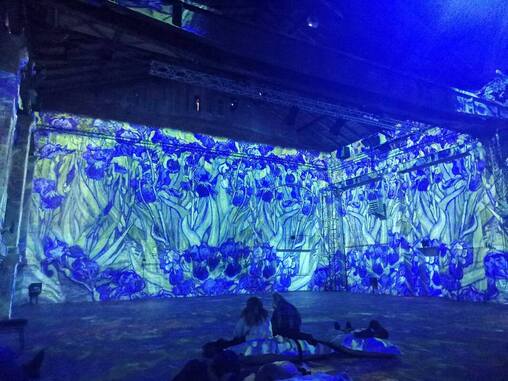 An audiovisual highlight: The van Gogh Experience in Leipzig.
An audiovisual highlight: The van Gogh Experience in Leipzig.
Let's talk about the exhibition at the KunstKraftwerk in Leipzig. How did you come to contribute the music?
It is a complex concept that I use to explain with the words „regia musicale“ (musical direction). I choose the pieces together with the three directors of the immersive shows at the very beginning of the creative process. Music is not a secondary actor in our connotation of immersive art, that is why is such an important part of the narration. When we put together the storyboard we think already about the mood we want to set with the music, which pieces from the repertoire we could use and where I will compose brand new stuff.
After we made the choices, I start to study the pieces on the score, like I have to play them or conduct them. This allows me to get into the compositional path of the work and allows me to edit respecting the main ideas. I then search for the right edition (vinyl, cd, digital, live recording) and the right performers. The choice is usually made following my personal taste and the timing of the scene. In certain points of the storyboard I feel clearly a musical idea in my mind, so I discuss the main mood of what will be a new composition with the other authors. For instance: in the Van Gogh show you saw, on the Starry nights tableaux we wanted a moment in which everyone could get lost in the beauty of the painting. I had in my ears the Mozart Concerto No. 21 but the ‚adnamento’ of the original composition didn't fit this idea of a stasis. So i recomposed the making the C major chord a sort of pedale that allows everyone to get lost in time. This brings to the methods of synchronization with the moving images.
This could be made in two different way:
- After I have edited the music, Massimiliano Siccardi, who is actually artist behind the animations, starts to work on moving the images. This usually happens when the music is from the repertoire.
- If I have to write brand new music, I usually receive the animation and I compose on it. This is not a strict scheme: mostly part of the time, the synch process is the result of several stages in which we keep working and reworking our ideas building them to the final result. The duration of the track is, as you can imagine, strictly connected to the video and the storyboard. I always take care about the over-all listening experience: the 30 minutes soundtrack should sound like one continuous composition. The relationship between the keys of each single pieces we chose is important thou, especially because I don’t use to fade out or cross-fade the tracks but I always try to give them a new ending or a brand-new start.
What did it mean to you that you were responsible for it?
It means what it always means to make choices, that is, to be exposed to judgment and criticism. I think it is very important to have a clear target audience and I think it is a virtuosity to maintain one's personality by aiming for large, huge numbers.
In my case, it is a good story to tell. The Van Gogh show that is now in Leipzig is also in a location in South Korea and until December it was simultaneously in France, both Paris and Provence. The first data count about 2 million spectators, 2 million visitors who paid a ticket to attend the show. My songs have been listened to at least 2 million times, searched by about half of the audience (the Shazam data give me confirmation of this) and this makes me happy because they are numbers very similar to those of the playlists, numbers that I personally do not do on Spotify but in the reality of a location that promotes immersive shows made of music and images. Of course there have been criticisms, sometimes very ferocious, but precisely this gives the measure that it is a real thing, which is a concretely measurable comparison.
Was it very difficult to combine picture and sound into an acoustic structure?
It is. The show you saw took 11 months for the creation and 2 months of work in loco to make it work the space. For the musical part for instance, I am supported in every location in which our shows are represented, by a sound engineer who perfectly knows the place and the system.
Unfortunately I could only watch the van Gogh Experience, but that was an audiovisual highlight and the visitors were thrilled. Why is such an experience still a niche product in art today?
Well, as I said before, numbers tell us that this kind of fruition is becoming more and more popular. But I think a lot is related to the subjects of the shows. In Leipzig for instance, I had the opportunity to experiment more: there are other titles like Work in Progress or Invisibles, with the direction by Ginevra Napoleoni, or Hundertwasser, directed by Gianfranco Iannuzzi, Renato Gatto e Massimiliano Siccardi in which I could compose in a different way, in which I could break some ‚production’ rules and use a different language (La Foresta delle Balene or Apparatus are good examples for instance). That because this shows, shorter than the main title, are not probably the main attraction for the venue. And I can understand that. Putting together a place like the one you saw is a multi-million investment and, like everything that has a commercial purpose, the fruits are seen with the gain on assets. It is an incontrovertible logic. The good news is that in places like Leipzig, there is an open-minded attitude, also due to the fact that the city is highly cultural, which has allowed those who manage teh venue to have a little more to promote experimentation.
Music, like art in general, should not be conditioned by the artist's age
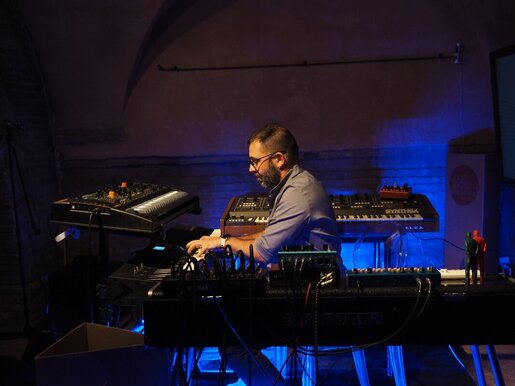 In his element: Luca Longobardi.
In his element: Luca Longobardi.
In times of casting & talent shows, how do you see the future for classical music?
Don’t think they will ever try to have a talent show or even a reality show with classical musicians. I think they tried once in Italy, but it failed after the second week. If the talent show are made to churn out fake tenors and or anonymous pop singers who expire after a season like cannon fodder, then I do not see any future.
What is the next step for a Luca Longobardi. How about writing music for a series or the cinema? Would you be ready for it?
What if I say that I have already did? I wrote the soundtrack for a feature film directed by Stefan Schwarz with Ross McCall (who has also written it), Allison Miller and Alessandra Mastronardi. I cannot tell you more about it but more news will be revealed in the next months. Also, with regard to television series, there is something cooking.
What many may not know, you are also a film freak - Which series or films have you recently been enthusiastic about or are you a fan of them?
Loved Euphoria, The Boys, Watch Men, Stranger Things. The last movie I saw recently was 1917 and I was impressed by the editing technique.
As a composer, you will certainly pay special attention to music from film and TV. What film music has impressed you most recently?
I cannot say Joker for I didn’t watch it yet!
The end of Game of Thrones was for you ...?
A Ni (Italian word that mixes No and Si (yes)). I really loved something like the OMG-why-is-it-all-black?’ episode but at same time I think the last season should have deserved something more. It is not the way about certain characters have been treated but the timing of this evolution, that was too fast. We waited forever for the last season, they should have found the budget to distribute the end of the story in more episodes. Again, not complaining about the narration, but about the timing of it. This thing made me so impressed that I wanted the last track of my album ”The Yard Sale” to be the longest one! The last chapter is as important as the first one: never rush on it.
Thanks Luca, the last words are yours:
Just one more thing about talent. I like to think when we talk about new talents that we don't mean only young talents. Music, like art in general, should not be conditioned by the artist's age but by the timeless quality of the idea. Be extremely young can be a plus, but it is not a necessary condition.
Links to Luca Longobardi:
|
Büreval (official video)
|
Der italienische Komponist und Musiker Luca Longobardi ist ein Mensch, der das Herz am rechten Fleck trägt. Ein herausragender Komponist der es versteht, die Aura von Melancholie und Emotionen zu bündeln, dass sie sich manifestieren, ewig tief im Herzen des Hörers. Zuletzt eindrucksvoll auf dem Album The Yard Sale, doch auch in Sachen audiovisueller Kunst lässt der Italiener die Besucher mit Erstaunen zurück. Es ist also einmal Zeit, den charmanten Komponisten ein paar Fragen zu stellen.
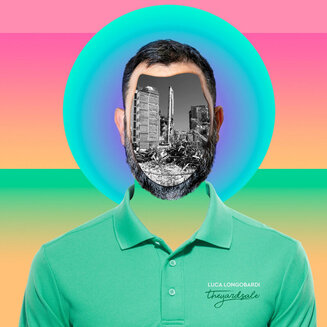 The Yard Sale erschien Ende 2019.
The Yard Sale erschien Ende 2019.
Hallo Luca, wie geht es dir gerade?
Fein! Beschäftigt, etwas gestresst, weil ich gleichzeitig an tausend Dingen arbeite, aber lächeln tue ich trotzdem.
The Yard Sale war Dein letztes Album, auf dem du progressive Ansätze verfolgst. Wie waren die Reaktionen darauf?
Die Leute lieben es (zum Glück)! Vinyls sind endlich da (es hat ewig gedauert, bis auch die Farbe der Scheibe absichtlich hergestellt wurde!) Und das superfarbige Kunstwerk geht jetzt in 18 verschiedene Länder. Und ich bin sehr glücklich, denn The Yard Sale ist mehr als ein musikalisches Projekt. Es kam mit einer präzisen, ästhetischen Idee heraus und der gesamte Prozess seiner Herstellung wurde mit Bildern und Videoeingaben erfüllt. Mein Interesse an visueller Kunst hat in den letzten zwei Jahren zugenommen und das hat sich auf meinen Kompositionsprozess ausgewirkt. Wie ich immer sagte, ist The Yard Sale der erste öffentliche Schritt aus meiner Komfortzone heraus.
Verrate doch einmal an welchen Stück du sehr lange feilen musstest, bevor es für dich perfekt war?
3.32.39, aus dem Album Plume. Es ist ein sehr intensives Stück, das in Erinnerung an die Opfer des Erdbebens geschrieben wurde, dass die Stadt L'Aquila 2009 schockierte, und eine Hymne an das Überleben und den Wiederaufbau. Der tatsächliche Wert und die filigrane Konstruktion des Stücks erforderten, dass ich vielleicht wie kein anderes Stück daran arbeiten musste.
Auch du unterliegst der akustischen Evolution, also findest immer neue Wege und Stile, die klassische Musik zu interpretieren – wie und wo sammelst du dafür die Kreativität?
Ich beobachte viel, was um mich herum ist. Meine Hauptinspirationsquelle ist mein tägliches Leben. Von dort aus zeichne ich, um meine Geschichten zu erzählen. Also überlege ich mir, welche Farben ich verwenden soll und welche Werkzeuge am besten geeignet sind, um sie zu beschreiben. Ich mag es wirklich, die klanglichen Möglichkeiten der Instrumente zu studieren, die ich besitze. Oft entstehen aus dieser Untersuchung neue Wege, sich dem kreativen Prozess zu nähern. Zu guter Letzt höre ich viel Musik, oft anders. Ich kaufe gerne Schallplatten, widme mich dem sorgfältigen Zuhören, höre immer wieder zu, was ich mag, weil ich denke, dass dies der beste Weg ist, um jedes Korn des Gedankens und Werkes eines anderen Komponisten zu entdecken.
Wie wird sich Deiner Meinung nach die moderne Klassik entwickeln, modernere Nuancen oder zurück zur alten Schule?
Warten wir auf Nils Frahms nächstes Album, um es herauszufinden!
Fein! Beschäftigt, etwas gestresst, weil ich gleichzeitig an tausend Dingen arbeite, aber lächeln tue ich trotzdem.
The Yard Sale war Dein letztes Album, auf dem du progressive Ansätze verfolgst. Wie waren die Reaktionen darauf?
Die Leute lieben es (zum Glück)! Vinyls sind endlich da (es hat ewig gedauert, bis auch die Farbe der Scheibe absichtlich hergestellt wurde!) Und das superfarbige Kunstwerk geht jetzt in 18 verschiedene Länder. Und ich bin sehr glücklich, denn The Yard Sale ist mehr als ein musikalisches Projekt. Es kam mit einer präzisen, ästhetischen Idee heraus und der gesamte Prozess seiner Herstellung wurde mit Bildern und Videoeingaben erfüllt. Mein Interesse an visueller Kunst hat in den letzten zwei Jahren zugenommen und das hat sich auf meinen Kompositionsprozess ausgewirkt. Wie ich immer sagte, ist The Yard Sale der erste öffentliche Schritt aus meiner Komfortzone heraus.
Verrate doch einmal an welchen Stück du sehr lange feilen musstest, bevor es für dich perfekt war?
3.32.39, aus dem Album Plume. Es ist ein sehr intensives Stück, das in Erinnerung an die Opfer des Erdbebens geschrieben wurde, dass die Stadt L'Aquila 2009 schockierte, und eine Hymne an das Überleben und den Wiederaufbau. Der tatsächliche Wert und die filigrane Konstruktion des Stücks erforderten, dass ich vielleicht wie kein anderes Stück daran arbeiten musste.
Auch du unterliegst der akustischen Evolution, also findest immer neue Wege und Stile, die klassische Musik zu interpretieren – wie und wo sammelst du dafür die Kreativität?
Ich beobachte viel, was um mich herum ist. Meine Hauptinspirationsquelle ist mein tägliches Leben. Von dort aus zeichne ich, um meine Geschichten zu erzählen. Also überlege ich mir, welche Farben ich verwenden soll und welche Werkzeuge am besten geeignet sind, um sie zu beschreiben. Ich mag es wirklich, die klanglichen Möglichkeiten der Instrumente zu studieren, die ich besitze. Oft entstehen aus dieser Untersuchung neue Wege, sich dem kreativen Prozess zu nähern. Zu guter Letzt höre ich viel Musik, oft anders. Ich kaufe gerne Schallplatten, widme mich dem sorgfältigen Zuhören, höre immer wieder zu, was ich mag, weil ich denke, dass dies der beste Weg ist, um jedes Korn des Gedankens und Werkes eines anderen Komponisten zu entdecken.
Wie wird sich Deiner Meinung nach die moderne Klassik entwickeln, modernere Nuancen oder zurück zur alten Schule?
Warten wir auf Nils Frahms nächstes Album, um es herauszufinden!
Meine klassische Ausbildung hat mich dazu gebracht, nach einer performativen Perfektion zu streben
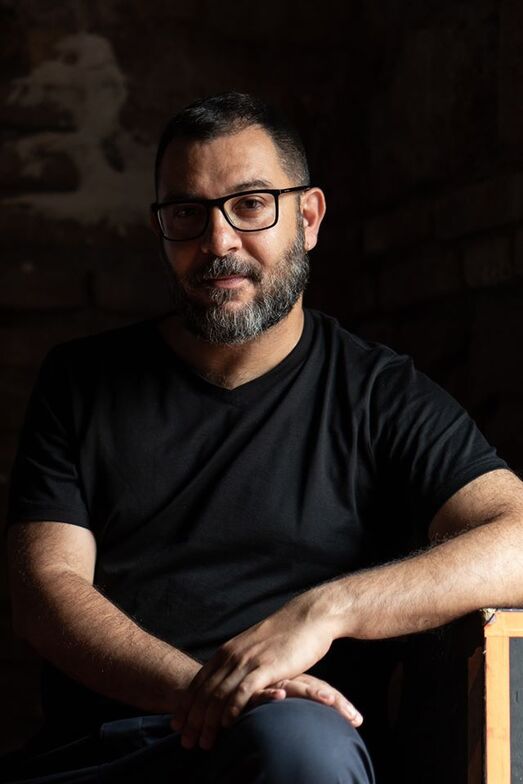 Der italienische Komponist Luca Longobardi.
Der italienische Komponist Luca Longobardi.
Ist klassische Musik mit Innovation schwieriger als andere Bereiche in der Musik?
Innovation ist nie einfach, auch weil Innovation, um solche zu sein, eine zeitliche Definition und einen zeitlichen Austausch erfordert. Mit anderen Worten, es braucht Anerkennung. Ich kann mir vorstellen, der Erste zu sein, der etwas ändert, und stattdessen wurde dieses Ding schon einige Zeit zuvor in einem anderen Teil der Welt ohne mein Wissen gemacht. Dennoch bleibt es eine Neuerung in meiner persönlichen Sprache, eine Neuheit für meine Art, Musik zu verstehen. In den frühen 1900er Jahren ging die klassische Musik zwei Wege: diejenigen, die aus der Vergangenheit schöpften, wie Strawinsky oder Bartok, einige Stilregeln umschrieben und andere beibehielten, und diejenigen, die über einen anderen Ansatz nachdachten und Performances und neue Sprachen in den Mittelpunkt stellten des künstlerischen Ausdrucks, wie Copland oder Cage. Jetzt befinden wir uns in einer Ära, in der diese x-te Überarbeitung der klassischen Regeln einem sehr großen Pool dient, wie dem von Audio-Video (TV) und passivem Hören (Wiedergabelisten mit 32 Stunden Musik!).
Nicht der Stil im Zentrum des kreativen Denkens oder der Performance, sondern der Geschmack des ultimativen Schauspielers der Kette, der das Publikum ist. Es sieht so aus, als ob die kommerzielle Notwendigkeit, unsere Musik in einer Spotify-Wiedergabeliste oder in einer Netflix-Serie zu platzieren, wichtiger ist als unsere spezifische Forschung zu dieser Musik. Innovationen von heute könnten bedeuten, einen Weg zu finden, um das große Publikum zu überraschen. Ein Publikum, dass sich in seiner gewohnten, vom Algorithmus gewählten Tracklist wohl fühlt und oft von Änderungen enttäuscht ist.
Italien hat ein sehr breites Spektrum an renommierten Komponisten und Pianisten, Frauen wie Männer. Was ist deiner Meinung nach dafür der Grund, warum italienische Klassik so exorbitant ausgeprägt ist?
Ich denke, es ist nur eine DNA-Angelegenheit und ich sage es, weil unser Land nichts dafür tut und ich wiederhole es noch einmal – Nichts. Berücksichtige zum Beispiel, was sie in England alles haben: BBC - Introducing, HelpMusician.org, LSO Soundhub sind eine Möglichkeit, Musiker und neue Musik zu fördern und ihnen zu helfen. Sie können sich online bewerben und Ihre Chance haben. Hier in Italien gibt es nichts Vergleichbares. In den letzten drei Jahren eröffnete SIAE, die italienische Agentur für das Sammeln von Urheberrechten, ein Musikexportbüro, um einer Karriere außerhalb des Landes zu helfen, und begann, offene Aufrufe zur Unterstützung von Musikern zu erstellen. Was an den letzten lustig ist, ist, dass es eine Altersgrenze gibt: In einem Land, in dem alles mindestens 20 Jahre zu spät ist, schneidet eine solche Grenze, insbesondere bei einem künstlerischen Wettbewerb, mindestens zwei Generationen von Musikern aus. Und wie Sie sagten, gibt es eine riesige Auswahl an klassischer Musik und Crossover-Musik, die bekannt werden könnte.
Musik ist die Sprache der Leidenschaft. Die Musik von dir ist sehr romantisch und auch sensibel, intim. Wie viel Herz und Seele stecken von dir selbst in den Stücken? Oder hältst du immer einen gewissen Abstand?
Ich habe mich immer sehr in die Musik involviert gefühlt, auch wenn ich klassische Musik im Konzert gespielt habe. Ich habe immer daran gearbeitet, mich in meinen Konzerten mit der Art von Distanz zu befassen, die für die Schauspieler erforderlich ist, mit einer emotionalen Rationalität, die manchmal unverzichtbar ist. Dies wird durch meine Kompositionen noch verstärkt: Es gibt einige Kompositionen, die mich immer noch zu Tränen rühren, andere, die ich mit größerer Reife schaffe. Aber es hat mich nie beunruhigt: Mein erster Klavierlehrer hat mir beigebracht, dass wir alle auf der Bühne entdeckt werden, alle nackt. Es ist eine notwendige Voraussetzung, wenn Sie ohne Worte kommunizieren wollen, und es ist eine Praxis, die mich immer stolz gemacht hat ein Darsteller.
Was ist Dir wichtiger: perfekt zu Spielen oder das Publikum zu berühren?
Beides, absolut beides. Meine klassische Ausbildung hat mich dazu gebracht, nach einer performativen Perfektion zu streben. Sicher ist, dass die Aufgabe eines Künstlers darin besteht, zu kommunizieren, seinen Standpunkt zu den Dingen darzulegen und dabei zu begeistern. Die mögliche falsche Note, der mögliche Fehler ist kein Drama und beeinträchtigt die Leistung nicht so sehr, dass sie vergeblich wird. Wenn ich jedoch eine gute technische Leistung erbringen kann, freue ich mich schon. Ich glaube nicht an diejenigen, die sagen, dass Musik nur das ist, was Sie emotional vermittelt: Die Technik wird durch Lernen erworben, wenn Sie es nicht tun, liegt es an Faulheit, schon gar nicht daran, dass Sie nicht über die Fähigkeiten verfügen.
Über die van Gogh Erfahrung im Kunstkraftwerk Leipzig
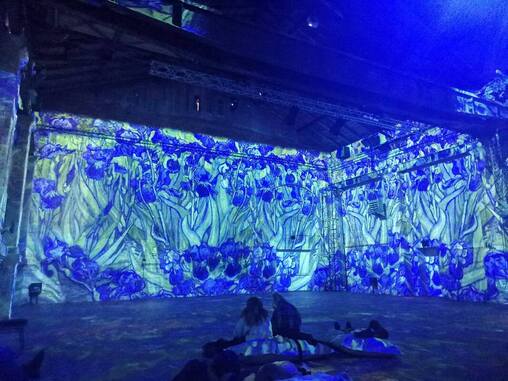 Ein audiovisuelles Highlight: van Gogh Experience in Leipzig.
Ein audiovisuelles Highlight: van Gogh Experience in Leipzig.
Reden wir mal über die Ausstellung im Kunstkraftwerk Leipzig. Wie kam es dazu, dass du dafür die Musik beigesteuert hast?
Es ist ein komplexes Konzept, das ich mit den Worten „regia musicale“ (musikalische Leitung) erkläre. Ich wähle die Stücke zusammen mit den drei Regisseuren der immersiven Shows zu Beginn des kreativen Prozesses aus. Musik ist kein sekundärer Akteur in unserer Konnotation von immersiver Kunst, deshalb ist sie ein so wichtiger Teil der Erzählung. Wenn wir das Storyboard zusammenstellen, denken wir bereits über die Stimmung nach, die wir mit der Musik einstellen möchten, welche Stücke aus dem Repertoire wir verwenden könnten und wo ich brandneue Sachen komponieren werde. Nachdem wir die Auswahl getroffen haben, beginne ich, die Stücke in der Partitur zu studieren, als müsste ich sie spielen oder dirigieren. Dies ermöglicht es mir, in den kompositorischen Pfad der Arbeit einzusteigen und die Hauptideen zu bearbeiten. Ich suche dann nach der richtigen Ausgabe (Vinyl, CD, Digital, Live-Aufnahme) und den richtigen Interpreten. Die Wahl wird normalerweise nach meinem persönlichen Geschmack und dem Zeitpunkt der Szene getroffen.
An bestimmten Stellen des Storyboards fühle ich mich eindeutig als musikalische Idee, daher diskutiere ich mit den anderen Autoren die Hauptstimmung einer neuen Komposition. Zum Beispiel: In der Van Gogh-Show, die du gesehen hast, wollten wir auf den Tableaus der Sternenächte einen Moment, in dem sich jeder in der Schönheit des Gemäldes sich verlieren könnte. Ich hatte das Mozart-Konzert Nr. 21 in meinen Ohren, aber „Adnamento“ der Originalkomposition passte nicht zu dieser Idee einer Stasis. Also habe ich den C-Dur-Akkord zu einer Art Pedal gemacht, das es jedem ermöglicht, sich in der Zeit zu verlieren.
Dies bringt zu den Methoden der Synchronisation mit den bewegten Bildern. Dies kann auf zwei verschiedene Arten erfolgen:
- Nachdem ich die Musik bearbeitet habe, beginnt Massimiliano Siccardi, der eigentlich Künstler hinter den Animationen ist, an der Bewegung der Bilder zu arbeiten. Dies geschieht normalerweise, wenn die Musik aus dem Repertoire stammt.
- Wenn ich brandneue Musik schreiben muss, erhalte ich normalerweise die Animation und komponiere darauf. Dies ist kein striktes Schema: Meistens ist der Synchronisierungsprozess das Ergebnis mehrerer Phasen, in denen wir weiterarbeiten und unsere Ideen überarbeiten, um sie zum Endergebnis zu führen. Die Dauer des Tracks ist, wie Sie sich vorstellen können, eng mit dem Video und dem Storyboard verbunden. Ich kümmere mich immer um das Gesamterlebnis: Der 30-minütige Soundtrack sollte wie eine kontinuierliche Komposition klingen. Die Beziehung zwischen den Tasten der einzelnen Stücke, die wir ausgewählt haben, ist wichtig, insbesondere, weil ich die Tracks nicht ausblende oder überblende, sondern immer versuche, ihnen ein neues Ende oder einen brandneuen Anfang zu geben.
Was hat es für Dich bedeutet, dass Du dafür verantwortlich bist?
Es bedeutet, Entscheidungen zu treffen. Das heißt, Urteilsvermögen und Kritik ausgesetzt zu sein. Ich denke, es ist sehr wichtig, eine klare Zielgruppe zu haben, und ich denke, es ist eine Virtuosität, die eigene Persönlichkeit zu bewahren, indem man große, große Zahlen anstrebt. In meinem Fall ist es, eine gute Geschichte zu erzählen. Die Van Gogh Show, die jetzt in Leipzig stattfindet, befindet sich ebenfalls in Südkorea und war bis Dezember gleichzeitig in Frankreich, sowohl in Paris als auch in der Provence. Die ersten Daten zählen etwa 2 Millionen Zuschauer, 2 Millionen Besucher, die ein Ticket für die Teilnahme an der Show bezahlt haben. Meine Songs wurden mindestens 2 Millionen Mal angehört und von etwa der Hälfte des Publikums durchsucht (die Shazam-Daten bestätigen dieses). Das freut mich, denn es sind Zahlen, die denen der Wiedergabelisten sehr ähnlich sind. Zahlen, die ich persönlich habe. Das ist nicht auf Spotify, sondern in der Realität eines Ortes, der immersive Shows aus Musik und Bildern fördert. Natürlich gab es Kritik, manchmal sehr heftig, aber genau dies gibt das Maß dafür, dass es sich um eine echte Sache handelt, die ein konkret messbarer Vergleich ist.
War es sehr schwierig, Bild und Ton zu einer akustischen Struktur zu kombinieren?
Ja war es. Die Show, die du gesehen hast, dauerte 11 Monate für die Erstellung und 2 Monate Arbeit in der Location, damit sie im Raum funktioniert. Für den musikalischen Teil zum Beispiel werde ich an jedem Ort, an dem unsere Shows vertreten sind, von einem Toningenieur unterstützt, der den Ort und das System perfekt kennt.
Leider konnte ich nur die van Gogh Experience sehen, aber das war ein audiovisuelles Highlight und die Besucher waren begeistert. Warum ist eine solche Erfahrung heute noch ein Nischenprodukt in der Kunst?
Nun, wie ich bereits sagte, sagen uns Zahlen, dass diese Art der Verwirklichung immer beliebter wird. Aber ich denke, viel hängt mit den Themen der Shows zusammen. In Leipzig hatte ich zum Beispiel die Gelegenheit, mehr zu experimentieren: Es gibt andere Titel wie „Work in Progress“ oder „Invisibles“ unter der Regie von Ginevra Napoleoni oder Hundertwasser unter der Regie von Gianfranco Iannuzzi, Renato Gatto und Massimiliano Siccardi, in denen ich komponieren konnte, auf eine andere Art und Weise, wie ich einige Produktionsregeln brechen und eine andere Sprache verwenden konnte. (La Foresta delle Balene oder Apparatus sind gute Beispiele).
Das liegt auch daran, dass diese Shows, die kürzer als der Haupttitel sind, wahrscheinlich nicht die Hauptattraktion für den Veranstaltungsort sind. Und das kann ich verstehen. Das Zusammenstellen eines Ortes wie dem, den Sie gesehen haben, ist eine Investition von mehreren Millionen, und wie alles, was einen kommerziellen Zweck hat, werden die Früchte mit dem Gewinn an Vermögen gesehen. Es ist eine unbestreitbare Logik. Die gute Nachricht ist, dass in Orten wie Leipzig eine aufgeschlossene Haltung herrscht, auch aufgrund der Tatsache, dass die Stadt sehr kulturell ist, was es denjenigen, die den Veranstaltungsort verwalten, ermöglicht hat, ein wenig mehr zu haben, um das Experimentieren zu fördern.
Musik sollte wie Kunst nicht vom Alter des Künstlers abhängig sein
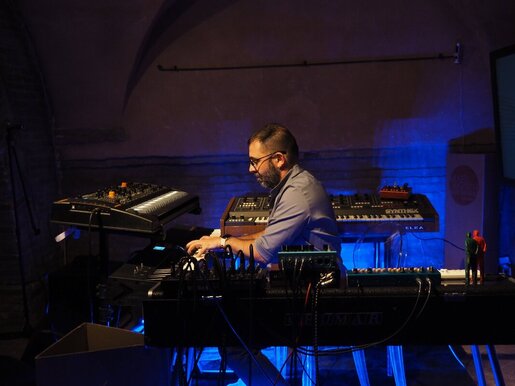 In seinem Element: Luca Longobardi.
In seinem Element: Luca Longobardi.
In Zeiten von Casting & Talentshows, wie siehst du die Zukunft für die klassische Musik?
Denke nicht, dass sie jemals versuchen werden, eine Talentshow oder sogar eine Reality-Show mit klassischen Musikern zu machen. Ich denke, sie haben es einmal in Italien versucht, aber es ist nach der zweiten Woche gescheitert. Wenn die Talentshow dazu gemacht ist, falsche Tenöre und / oder anonyme Popsänger hervorzubringen, die nach einer Saison wie Kanonenfutter auslaufen, dann sehe ich darin keine Zukunft.
Was ist der nächste Schritt für einen Luca Longobardi? Wie wäre es mit Musik für eine Serie oder das Kino? Würdest du dafür bereit sein?
Was ist, wenn ich sage, dass ich es bereits getan habe? Ich habe den Soundtrack für einen Spielfilm unter der Regie von Stefan Schwarz mit Ross McCall (der ihn auch geschrieben hat), Allison Miller und Alessandra Mastronardi geschrieben. Ich kann Ihnen nicht mehr darüber erzählen, aber in den nächsten Monaten werden weitere Neuigkeiten bekannt gegeben. Auch in Bezug auf Fernsehserien habe ich etwas im Köcher…
Was viele vielleicht nicht wissen, du bist auch ein Filmfreak – Welche Serien oder Filme haben dich vor kurzem begeistert oder bist du Fan davon?
Liebe Euphoria, The Boys, Watch Men & Stranger Things. Der letzte Film, den ich kürzlich gesehen habe, war 1917 und ich war beeindruckt von der Bearbeitungstechnik.
Als Komponist hört man bei der Musik von Film und TV sicher ganz besonders hin. Welche Filmmusik hat dich zuletzt beeindruckt?
Ich würde den Film Joker sagen, weil ich es noch nicht gesehen habe.
Das Ende von Game of Thrones war für dich ...?
Ein Ni (italienisches Wort, das Nein und Si (Ja) mischt). Ich habe so etwas wie die OMG-Warum-ist-alles-schwarz-Folge wirklich geliebt, aber gleichzeitig denke ich, dass die letzte Staffel etwas mehr hätte verdienen sollen. Es ist nicht die Art und Weise, wie bestimmte Charaktere behandelt wurden, sondern das Timing dieser Entwicklung, das zu schnell war. Wir haben ewig auf die letzte Staffel gewartet, sie hätten das Budget finden sollen, um das Ende der Geschichte in mehr Folgen zu verteilen. Wiederum nicht über die Erzählung zu klagen, sondern über das Timing. Dieses Ding hat mich so beeindruckt, dass ich wollte, dass der letzte Titel meines Albums "The Yard Sale" der längste ist! Das letzte Kapitel ist genauso wichtig wie das erste: Beeilen Sie sich nie darauf.
Danke Luca, die letzten Worte gehören dir:
Nur noch eine Sache über Talente:
Ich denke gerne, wenn wir über neue Talente sprechen, dass wir nicht nur junge Talente meinen. Musik sollte wie Kunst im Allgemeinen nicht vom Alter des Künstlers abhängig sein, sondern von der zeitlosen Qualität der Idee. Extrem jung zu sein kann ein Plus sein, ist aber keine notwendige Bedingung.
Das Interview führte André Schönauer
Links zu Luca Longobardi:
|
Büreval (official video)
|
